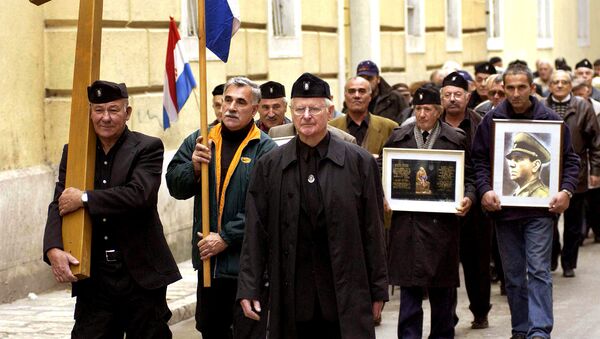The plaque was put up by local veterans and supporters of the Croatian Defense Forces (HSO), a paramilitary group associated with the far-right Croatian Party of Rights (HSP), which was set up in 1990.
The HSO paramilitary group shares its name with the armed forces of the fascist NDH, and its members aimed to expand Croatia's borders eastwards to those of the 1940s fascist state, which included all of present day Bosnia and southwest Vojvodina, a part of Serbia.
Although the group didn't succeed in this aim, it did manage to become subsumed into Croatia's official armed forces in 1992.
Several of the paramilitary group's fighters died during fighting in the Yugoslav conflict of the early 1990s, and the HSO's plaque has been mounted in their honor.
Ustasha leader Ante Pavelic became leader of the NDH in 1941, when the regime was established by Germany and Italy following the invasion and occupation of the Kingdom of Yugoslavia.
Miodrag Linta, president of the region's Union of Serbs, told Sputnik Srbija that the presence of the fascist slogan in Jasenovac, where thousands died at the hands of the NDH regime, is proof of the link between the formation of modern Croatia, and the former fascist state.
"This is yet more proof that Croatian soldiers and police in the armed conflicts of the 1990s were fighting to establish the manifesto of the NDH and the Ustasha movement, to create Croatia without Serbs," Linta said.
"This also shows that the so-called 'homeland war' (the Croatian name for the 1990s war) is a myth, that it wasn't any kind of war of independence or democracy but a criminal enterprise with the aim of a 'final solution' of the Serbian question in accordance with the Ustasha manifesto."
War in Croatia eventually ended in 1995, when Croatian armed forces carried out Operation "Oluja" (Storm) in the self-declared Srpska Krajina. According to various estimates, between 214 and 1,192 Serbian civilians were killed during the offensive, which forced around 230,000 Croatian Serbs to flee their homes as refugees.
Vojislav Macoko, a journalist for Croatia's Index.hr, told Sputnik Srbija that Croats have an ambivalent relationship to HSO paramilitaries, since they are believed to have played an important part in the establishment of the Croatian state in the early 1990s.
"The HSO was an important component of the Croatian armed forces in the homeland war. At the beginning it was organized as a party militia, but it was very quickly incorporated into the official Croatian armed forces and became an important part. HSO members were the toughest fighters, a lot of them died and they were thought of as brave warriors," Macoko said.
Macoko agreed with criticism of the plague's slogan, and its location at Jasenovac.
"A memorial to fallen HOS has been put up in Jasenovac, with the inscription 'For home [land] — ready!' That is unacceptable for a number of reasons. The first is that it is unacceptable to erect a monument with such a greeting, because it's the Ustasha salute. This is public glorification of domestic Nazism. The other reason is because it is, of course, Jasenovac," Macoko said.
Last week Croatian Prime Minister Andrej Plenkovic responded to the furor with the promise of an enquiry into how permission for such a memorial came to be given, and sought to give a politically balanced expression of respect for the memories of those who died.
"Of course that this monument was erected right in the center of Jasenovac is a delicate issue, but this is the coat of arms of this group, which received the approval of the City of Zagreb and the consent of the previous SDP government's Ministry of Public Administration. This tells us that we have not properly set up the legal framework and practice when it comes to totalitarian systems. So I want to start an institutional initiative that will regulate this issue appropriately."
"We will seek a legal solution because at the moment we have no mechanism to address this issue, '' the Prime Minister added.







